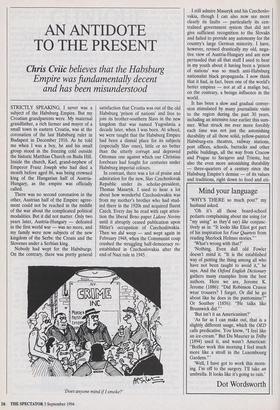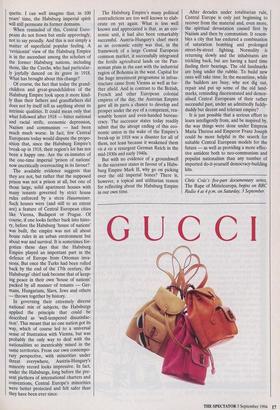AN ANTIDOTE TO THE PRESENT
Chris Cviic believes that the Habsburg
Empire was fundamentally decent and has been misunderstood
STRICTLY SPEAKING, I never was a subject of the Habsburg Empire. But my Croatian grandparents were. My maternal grandfather, a rich farmer and mayor of a small town in eastern Croatia, was at the coronation of the last Habsburg ruler in Budapest in December 1916. As he told me when I was a boy, he and his small group stood in the freezing cold outside the historic Matthias Church on Buda Hill. Inside the church, Karl, grand-nephew of Emperor Franz Joseph who had died a month before aged 86, was being crowned king of the Hungarian half of Austria- Hungary, as the empire was officially called.
There was no second coronation in the other, Austrian half of the Empire: agree- ment could not be reached in the middle of the war about the complicated political modalities. But it did not matter. Only two years later, Austria-Hungary — defeated in the first world war — was no more, and my family were now subjects of the new kingdom of the Serbs: the Croats and the Slovenes under a Serbian king.
Nobody had wept for the Habsburgs. On the contrary, there was pretty general satisfaction that Croatia was out of the old Habsburg 'prison of nations' and free to join its brother-southern Slays in the new kingdom that was named Yugoslavia a decade later, when I was born. At school, we were taught that the Habsburg Empire had been a dismal place for its subjects (especially Slav ones), little or no better than the utterly corrupt and depraved Ottoman one against which our Christian forebears had fought for centuries under Habsburg imperial colours.
In contrast, there was a lot of praise and admiration for the new, Slav Czechoslovak Republic under its scholar-president, Thomas Masaryk. I used to hear a lot about how wonderful Czechoslovakia was from my mother's brother who had stud- ied there in the 1920s and acquired fluent Czech. Every day he read with rapt atten- tion the liberal Brno paper Lidove Noviny until it abruptly ceased publication upon Hitler's occupation of Czechoslovakia. Then we did weep — and wept again in February 1948, when the Communist coup crushed the struggling half-democracy re- established in Czechoslovakia after the end of Nazi rule in 1945.
'Does anyone mind if I smoke?' I still admire Masaryk and his Czechoslo- vakia, though I can also now see more clearly its faults — particularly its cen- tralised government system that did not give sufficient recognition to the Slovaks and failed to provide any autonomy for the country's large German minority. I have, however, revised drastically my old, nega- tive view of Austria-Hungary and am now persuaded that all that stuff I used to hear in my youth about it having been a 'prison of nations' was so much anti-Habsburg nationalist black propaganda. I now think that it had, in fact, been one of the world's better empires — not at all a malign but, on the contrary, a benign influence in the world.
It has been a slow and gradual conver- sion stimulated by many journalistic visits to the region during the past 30 years, including an intensive tour earlier this sum- mer. What struck me ever more forcibly each time was not just the astonishing durability of all those solid, yellow-painted Habsburg-era theatres, railway stations, post offices, schools, barracks and other public buildings, all the way from Cracow and Prague to Sarajevo and Trieste, but also the even more astonishing durability — three-quarters of a century since the Habsburg Empire's demise — of its values and traditions, right down to food and eti- quette. I can well imagine that, in 100 years' time, the Habsburg imperial spirit will still permeate its former domains.
When reminded of this, Central Euro- peans do not frown but smile approvingly, not to say proudly. And this is not simply a matter of superficial popular feeling. A 'revisionist' view of the Habsburg Empire is in the ascendant among the scholars of the former Habsburg nations, including those, like the Czechs, who had particular- ly joyfully danced on its grave in 1918. What has brought about this change?
Of course, the fact that today the grand- children and great-grandchildren of the Habsburg Empire look upon it more kind- ly than their fathers and grandfathers did does not by itself tell us anything about its intrinsic qualities. It could mean only that what followed after 1918 — bitter national and racial strife, economic depression, Nazism and communism — had been much much worse. In fact, few Central Europeans today would dispute the propo- sition that, since the Habsburg Empire's break-up in 1918, their region's lot has not been a happy one. Are the ex-inmates of the one-time imperial 'prison of nations' now uncritically overreacting in its favour?
The available evidence suggests that they are not, but rather that the supposed prison was not a prison at all, but one of those large, solid apartment houses with many tenants governed by strict house rules enforced by a stern Hausmeister. Such houses were (and still to an extent are) a feature of Central European cities like Vienna, Budapest or Prague. Of course, if one looks farther back into histo- ry, before the Habsburg 'house of nations' was built, the empire was not all about house rules in an urban environment but about war and survival. It is sometimes for- gotten these days that the Habsburg Empire played an important part in the defence of Europe from Ottoman inva- sions. But once the Turks had been rolled back by the end of the 17th century, the Habsburgs' chief task became that of keep- ing peace in their own 'house of nations' packed by all manner of tenants — Ger- mans, Hungarians, Slays, Jews and others — thrown together by history.
In governing their extremely diverse national mix of subjects, the Habsburgs applied the principle that could be described as 'well-tempered dissatisfac- tion'. This meant that no one nation got its way, which of course led to a universal sense of frustration with Vienna, but was probably the only way to deal with the nationalities so inextricably mixed in the same territories. From our own contempo- rary perspective, with minorities under threat everywhere, Austria-Hungary's minority record looks impressive. In fact, under the Habsburgs, long before the pre- sent plethora of international charters and conventions, Central Europe's minorities were better protected and felt safer than they have been ever since. The Habsburg Empire's many political contradictions are too well known to elab- orate on yet again. What is less well known and appreciated is that, as an eco- nomic unit, it had also been remarkably successful. Austria-Hungary's chief merit as an economic entity was that, in the framework of a large Central European common market, it successfully integrated the fertile agricultural lands on the Pan- nonian plain in the east with the industrial region of Bohemia in the west. Capital for the huge investment programme in infras- tructure came from Vienna as well as fur- ther afield. And in contrast to the British, French and other European colonial empires of the day, the Austrian Empire gave all its parts a chance to develop and prosper under the eye of a competent, rea- sonably honest and even-handed bureau- cracy. The successor states today readily admit that the abrupt ending of this eco- nomic union in the wake of the Empire's break-up in 1918 was a disaster for all of them, not least because it weakened them vis a vis a resurgent German Reich in the mid-1930s and early 1940s.
But with no evidence of a groundswell in the successor states in favour of a Habs- burg Empire Mark II, why go on picking over the old imperial bones? There is, however, a topical and utilitarian reason for reflecting about the Habsburg Empire in our own time. After decades under totalitarian rule, Central Europe is only just beginning to recover from the material and, even more, the spiritual devastation caused first by Nazism and then by communism. It resem- bles a city that has endured a combination of saturation bombing and prolonged street-by-street fighting. Normality is returning slowly and the inhabitants are trickling back, but are having a hard time finding their bearings. The old landmarks are lying under the rubble. To build new ones will take time. In the meantime, while the builders are busy, why not dig out, repair and put up some of the old land- marks, reminding disorientated and demor- alised Central Europeans of their rather successful past, under an admittedly fuddy- duddy but decent and tolerant empire?
It is just possible that a serious effort to learn intelligently from, and be inspired by, the way things were done under Empress Maria Theresa and Emperor Franz Joseph could be more helpful in the search for suitable Central European models for the future — as well as providing a more effec- tive antidote both to neo-communism and populist nationalism than any number of imported do-it-yourself democracy-building kits.
Chris Cviic's five-part documentary series, The Rape of Mitteleuropa, begins on BBC Radio 4 at 4 p.m. on Saturday, 3 September.



























































 Previous page
Previous page